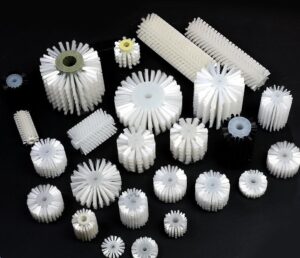“Industrial brushes are an essential tool used in various industrial applications. The manufacturers design these brushes in various sizes, shapes, and materials to perform various tasks, such as cleaning, deburring, finishing, and polishing.”
Many industrial processes rely on them to keep machinery and equipment clean and functioning correctly. This article will explore industrial brushes’ definition, features, and usage. We will discuss different types of industrial brushes and their applications.
What are industrial brushes, and why are they used for?
Industrial brushes find applications in various industrial processes, serving as specialized tools for cleaning, deburring, polishing, and surface finishing. These brushes come in a variety of materials, sizes, and forms. Let’s delve into some of the reasons behind the utilization of industrial brushes:
- Cleaning: Industrial brushes are often used to clean equipment, machinery, and parts in different industries. They can remove dust, dirt, and debris from surfaces and crevices that are difficult to reach with other cleaning methods.
- Deburring: After cutting or shaping, industrial brushes remove sharp edges or burrs left on metal, plastic, or other materials. They can also smooth out rough surfaces, producing a more polished finish.
- Polishing: Industrial brushes often polish and buff surfaces to improve their appearance and texture. They can create a smooth, uniform finish on metal, wood, and other materials.
- Surface finishing: Industrial brushes create specific surface finishes on materials, such as matte, satin, or polished. This is important in industries like automotive, where the finish of a vehicle can impact its overall aesthetic appeal.
What are industrial brushes made of?
Depending on the intended application, manufacturers make industrial brushes from various materials. Some of the most common materials used for industrial brushes include:
- Nylon: Nylon is a popular material for industrial brushes as it is durable, flexible, and resistant to wear and tear. Nylon brushes are often used for cleaning, polishing, and deburring.
- Brass: Brass is a metal often used for industrial brushes as it is durable and has excellent electrical conductivity. Brass brushes are often used for cleaning and polishing surfaces.
- Stainless steel: Stainless steel brushes are durable and corrosion-resistant, making them ideal for use in harsh industrial environments. They are often used for deburring and cleaning applications.
Abrasive materials like diamond, silicon carbide, or aluminum oxide can also make industrial brushes. People use these brushes for grinding and polishing applications.
What Are The Most Popular Industrial Brushes?
Wire Brushes
Wire brushes are commonly used in industrial applications for surface preparation and cleaning. Wire bristles in different shapes and sizes, such as flat, circular, or cup-shaped, make up these brushes. People can use wire brushes on various surfaces, including metal, concrete, and wood, and they are ideal for removing rust, paint, and other stubborn debris.
Abrasive Brushes
The design of abrasive brushes involves removing surface material through mechanical action and abrasive particles. People commonly use them in metalworking and other industrial applications where a high degree of precision is necessary. Abrasive brushes come in various abrasive materials, such as aluminum oxide, silicon carbide , and diamond.
Strip Brushes
Strip brushes consist of a long strip of bristles held in a metal channel or backing. They seal gaps and spaces between moving parts in machinery to prevent the entry of dust, dirt, or other pollutants. Strip brushes are also used in conveyor systems to clean or transport products.
Spiral Brushes
Spiral brushes are wire or synthetic bristles twisted around a central wire shaft. They are commonly used in cleaning applications, such as removing dirt and debris from machinery or cleaning conveyor belts. Spiral brushes are available in different diameters and lengths to suit various applications.
Twisted-in-Wire Brushes
Bristles Twisted into a Wire Shaft Makeup Twisted-in-Wire Brushes. They are Commonly used for cleaning and defer). Hes are available in different wire gauges and bristle materials, such as nylon, Brass, or stainless steel.
How to use an industrial brush?
For the job at hand, choose a suitable brush. Consider the size and shape of the brush, as well as the type of bristles and their stiffness.
- Make sure the brush is clean and free of debris before using it.
- Hold the brush firmly and apply the appropriate pressure, depending on the task. Use a back-and-forth or circular motion, depending on the cleaned surface.
- Use the brush in a well-ventilated area, especially if using abrasive brushes, as they can generate dust and debris.
- After use, clean the brush thoroughly and store it in a dry, safe place.
FAQs
What are the most common materials used to make industrial brushes?
Industrial brushes are typically made from synthetic materials, such as nylon or polypropylene, or natural materials, such as horsehair or hog bristles. Some brushes also feature metal bristles, such as those made from steel or brass.
Can I use an industrial brush on delicate surfaces like glass or ceramics?
Using abrasive brushes on delicate surfaces is not recommended, as this can cause scratching or damage. Instead, select a brush with softer bristles, such as those made from natural materials like horsehair.
How should I clean and store my industrial brushes?
After use, industrial brushes should be cleaned thoroughly and allowed to dry before storage—store brushes in a dry, safe place to prevent damage or contamination.

